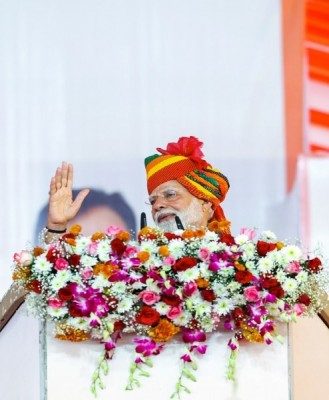 India-UK
India-UK
India-UK virtual summit strengthens STI cooperation
New Delhi: Prime Minister of India Narendra Modi and UK Prime Minister Boris Johnson agreed on a common vision of a new and transformational Comprehensive Strategic Partnership between the UK and India, and adopted an ambitious India-UK Roadmap to 2030 to steer cooperation for the next 10 years.
Both leaders met virtually on 4 May 2021 and emphasised their shared commitment to an enhanced partnership in science, education, research and innovation and look forward to the next ministerial Science and Innovation Council (SIC), read an official statement issued by the Indian government.
They welcomed the signing of the new UK-India MoU on Telecommunications/ICT and the Joint Declaration of Intent on Digital and Technology, the establishment of new high-level dialogues on tech, new joint rapid research investment into Covid19, a new partnership to support zoonotic research, new investment to advance understanding of weather and climate science, and the continuation of the UK-India Education and Research Initiative (UKIERI).
They agreed to expand and enhance the existing UK-India vaccines partnership, highlighting the successful collaboration between Oxford University, Astra Zeneca and the Serum Institute of India on an effective Covid19 vaccine that is ‘developed in UK’, ‘Made in India’ and ‘distributed globally’.
They emphasized that the international community should learn lessons and agreed to work together to reform and strengthen WHO and the global health security architecture to strengthen pandemic resilience.
Some of the key points to strengthen STI cooperation between two countries are:
Enhance cooperation between India and the UK on strengthening the role of women in STEMM at schools, universities, and research institutions and creating an enabling environment for equal participation of women in STEM disciplines through collaboration on new initiatives like Gender Advancement for Transforming Institutions (GATI) project.
Develop collaborations between Industry, Academia and the Government to foster innovation among school students by focusing on teacher training, mentoring and sharing of global best practices through initiatives like the India Innovation Competency Enhancement Program (IICEP).
Build on the two countries’ existing bilateral research, science and innovation infrastructure and governmental relationships to continue to support high-quality, high-impact research and innovation through joint processes. Position the UK and India as mutual partners of choice and a force for good in the world in areas of shared priority, including health, the circular economy, climate, clean energy, urban development and engineering healthier environments, waste-to-wealth, manufacturing, cyber physical systems, space and related research.
Forge partnership across the pipeline of research and innovation activity, from basic research to applied and interdisciplinary research and through to translation and commercialisation across government departments to optimise impact, utilize expertise and networks and minimise duplication.
Leverage and build on existing, long-standing bilateral partnerships such as on education, research and innovation, to stimulate a joint pipeline of talent, excellent researchers and early-career innovators and explore new opportunities for student and researchers exchanges by establishing joint centres and facilitating access to state-of-the-art facilities.
Work together to share knowledge and expertise regarding artificial intelligence, scientific support to policies and regulatory aspects including ethics, and promote a dialogue in research and innovation. Through Tech Summits, bring together tech innovators, scientists, entrepreneurs and policy makers to work together on challenges including the norms and governance of future tech under the cross-cutting theme of ‘data’.
Grow programmes such as the Fast Track Start-Up Fund to nurture innovation led, sustainable growth and jobs, and tech solutions that benefit both countries. Explore partnerships with joint investment to enable the growth of technology-enabled innovative businesses and increase the number of start-ups and MSMEs growing and scaling-up internationally, for example in relation to climate and the environment, med tech devices, industrial biotech and agriculture, and sustainable development, helping to achieve the Global Goals by 2030.
Support Our Journalism
We cannot do without you.. your contribution supports unbiased journalism
IBNS is not driven by any ism- not wokeism, not racism, not skewed secularism, not hyper right-wing or left liberal ideals, nor by any hardline religious beliefs or hyper nationalism. We want to serve you good old objective news, as they are. We do not judge or preach. We let people decide for themselves. We only try to present factual and well-sourced news.







